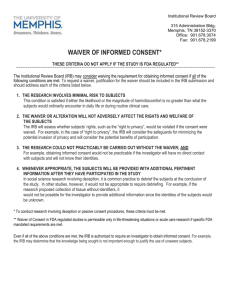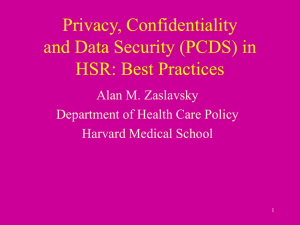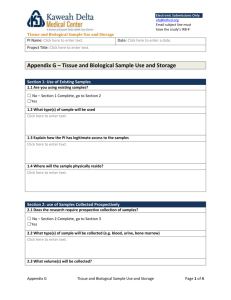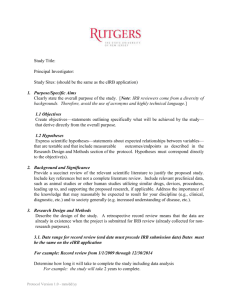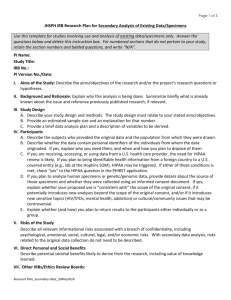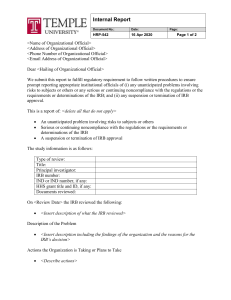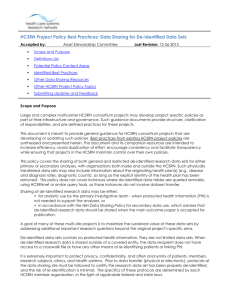application for irb waiver of hipaa privacy
advertisement
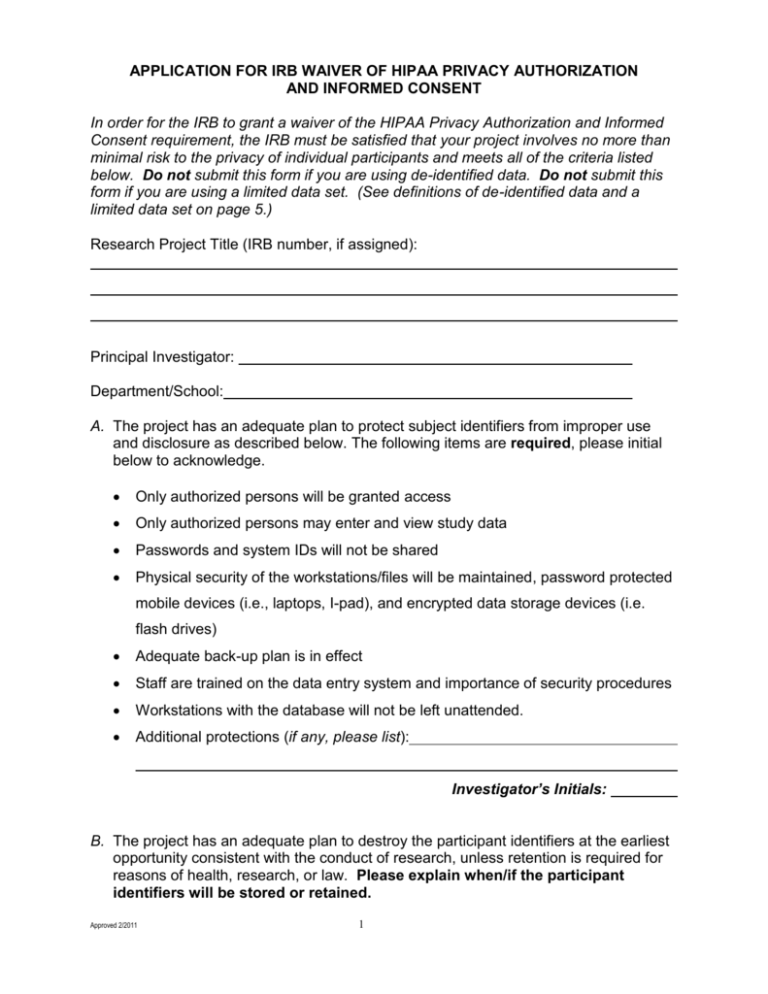
APPLICATION FOR IRB WAIVER OF HIPAA PRIVACY AUTHORIZATION AND INFORMED CONSENT In order for the IRB to grant a waiver of the HIPAA Privacy Authorization and Informed Consent requirement, the IRB must be satisfied that your project involves no more than minimal risk to the privacy of individual participants and meets all of the criteria listed below. Do not submit this form if you are using de-identified data. Do not submit this form if you are using a limited data set. (See definitions of de-identified data and a limited data set on page 5.) Research Project Title (IRB number, if assigned): Principal Investigator: Department/School: A. The project has an adequate plan to protect subject identifiers from improper use and disclosure as described below. The following items are required, please initial below to acknowledge. Only authorized persons will be granted access Only authorized persons may enter and view study data Passwords and system IDs will not be shared Physical security of the workstations/files will be maintained, password protected mobile devices (i.e., laptops, I-pad), and encrypted data storage devices (i.e. flash drives) Adequate back-up plan is in effect Staff are trained on the data entry system and importance of security procedures Workstations with the database will not be left unattended. Additional protections (if any, please list): Investigator’s Initials: B. The project has an adequate plan to destroy the participant identifiers at the earliest opportunity consistent with the conduct of research, unless retention is required for reasons of health, research, or law. Please explain when/if the participant identifiers will be stored or retained. Approved 2/2011 1 Patient identifiers including name and medical record number are necessary during the data collection and analysis phase of this project. Databases with patient information including identifiers will be kept in a password protected database and hard copies in a locked desk or file cabinet. All patient data will be de-identified prior to inclusion in published reports. Patient identifiers will be destroyed __ years after final publication of results. C. Explain why the research could not practicably be conducted without the waiver. This is a retrospective review and analysis of patients with _______________________ who were seen at St. Luke’s Episcopal Hospital/ Texas Heart Institute. It is anticipated that records from approximately ________ patients may be reviewed for this retrospective review. The research could not be practicably carried out without the waiver because staff and financial resources to contact each patient would be prohibitive, since many of them may not be from the local area or could be deceased. D. Explain why the research could not practicably be conducted without access to and use of the data/specimens. This project is based solely on data analysis. Access to the medical records is essential to collect the specific data points to analyze in an effort to determine___________________ __________________________ _. The patient identifiers are required to access the medical records for review of the data to be used in this study. Patient data will be de-identified prior inclusion in any publications. Necessary Information. The following is a brief description of the PHI that is necessary for use or access for conducting this study. For this study, the patient diagnosis, comorbidities, medications, eligibility for transplant, NYHA status, medical history, pathology, imaging data, laboratory results, cardiology test results, and demographic data, etc will be required. E. Per 45CFR46.116 (d) an IRB may approve a consent procedure which does not include, or which alters, some or all of the elements of informed consent set forth in this section, or waive the requirements to obtain informed consent provided the IRB finds and documents that: 1. The research involves no more than minimal risk to the subjects; This is a retrospective review of existing patient data and therefore provides no more than minimal risk for subjects. Data are kept in password protected databases or locked file cabinets to minimize any risk to participants related to confidentiality. 2. The waiver or alteration will not adversely affect the rights and welfare of the subjects; Since this is a retrospective review of existing data, the rights and welfare of the subjects will not be adversely affected Approved 2/2011 2 3. Whenever appropriate, the subjects will be provided with additional pertinent safety information after participation; If pertinent safety information is obtained during the course of this retrospective chart review, all attempts will be made to contact the participants and provide them with the relevant information. F. Information about data/specimens will not be used or disclosed to any other person or entity, except as required by law, for authorized oversight of the research study, or for use in future IRB approved research. Please affirm your acceptance below with your signature. The data collected for this project will not be used or disclosed for any other purpose other than the research project described in this application except as a.) required by law, b.) for authorized oversight of the research study, or c.) for other research for which the use or disclosure is permitted by the Privacy Rule. My research team and I will comply with the use and disclosure restrictions described above to protect the confidentiality of patient information and ensure privacy of the protected health information. (Signature) (Date) This application form does not replace the requirement to submit an application for Human Subjects Research to the St. Luke’s IRB for an individual research project. Please be aware, if a protocol is granted a “Waiver of Authorization” by the St. Luke's Episcopal Hospital IRB, the PI must be prepared to provide the St. Luke’s Medical Records Department the following information for any PHI disclosed outside of St. Luke’s Episcopal Hospital: 1. The date of the disclosure; 2. The name, title, and contact number of the person making the disclosure; 3. The name of the entity or person who received the protected patient information, and, if known, the address of such entity or person; 4. A brief description of the protected patient information disclosed; and 5. A brief statement of the purpose of the disclosure that reasonably describes the basis for the disclosure. This mandate is pursuant to 45 CFR 164.528, which states that an individual has the right to request and receive an accounting from the covered entity (St. Luke's Episcopal Hospital) of all possible disclosures of their private health information that was permitted without the individual's authorization. Approved 2/2011 3 FOR IRB USE ONLY Review and Approval Procedures. This alteration or waiver of authorization has been reviewed and approved under either of the following [check one]: _____ Normal review procedures. _____ Expedited review procedures. Decision Regarding Waiver or Alteration. The IRB has decided to [check one]: _____ Waive the otherwise required informed consent _____ Waive the otherwise required authorization; or _____ Alter the otherwise required HIPAA Privacy Authorization and Informed Consent as follows: ________________________________________________________________________ ________________________________________________________________________ ________________________________________________________________________ Required Signature. This waiver or alteration has been approved as evidenced by the signature of the Chairman of the IRB (or his or her designee): Name: ___________________________________________________________ Signature:_________________________________________________________ Title [check one]: _____ Chairman of the IRB or Privacy Board _____ Designee of the Chairman of the IRB or Privacy Board Date: ____________________________________________________________ Approved 2/2011 4 Definitions of HIPAA Terms De-identified Data: The Safe Harbor under HIPAA includes data that has had all of the following identifiers removed. This de-identified data is not considered to be Protected Health Information (PHI): Names Geographic subdivisions smaller than a state except first three digits of the zip code; All elements of dates (except year) for individuals under 90 years old; all elements of dates (including year) for those over 90 years old; Telephone numbers; Fax numbers; E-mail addresses; Social security numbers; Medical record numbers; Health plan beneficiary numbers; Account numbers; Certificate/license numbers; Vehicle identifiers and serial numbers, including license plate numbers; Device identifiers and serial numbers; Web Universal Resource Locators (URLs); Internet protocol address numbers; Biometric identifiers, including voice and finger prints; Full face photographic images and any comparable images; Any other unique, identifying number characteristic, or code, with some exceptions. Expert Certification of De-identified Data: The second Safe Harbor category under HIPAA considers information that an expert certifies has very small risk (alone or in combination with other available information) of identifying the participant. Limited Data Set: A limited data set is information that is stripped of the direct identifiers (above) of the participant or of relatives, employers or household members of the participant except Town, city, state and 5-digit zip code; All elements of dates for dates directly related to the individual, including birth date, admission date, discharge date, and date of death. Data Use Agreement: Approved 2/2011 A researcher must sign a data use agreement, prior to using a limited data set, assuring appropriate use of the PHI and that the researcher will not re-identify the information or contact the individuals. 5
